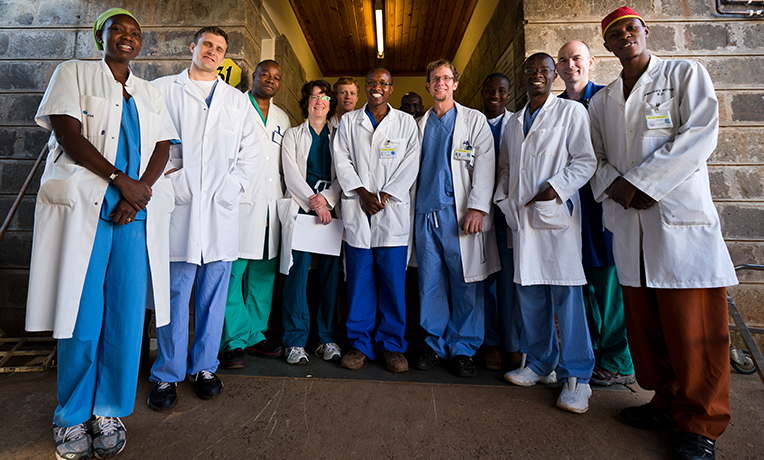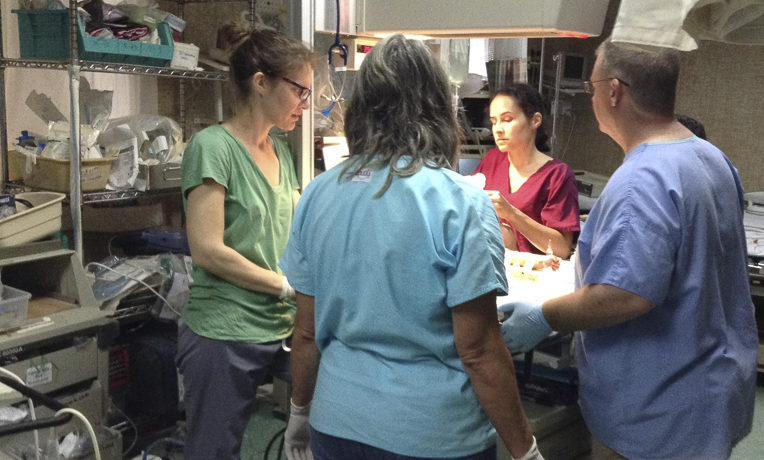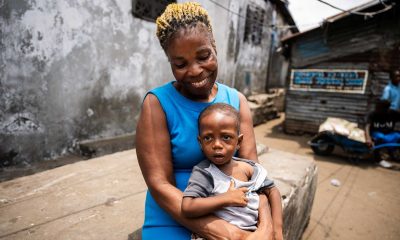Read how, through perseverance and prayer, these doctors helped a mother and her newborn son make it through a medical crisis in Central America.
By Dr. Anne Hotz, a career medical missionary, who together with her husband Dr. Isaac Hotz, began working at Hospital Loma de Luz in Honduras in 2015 through World Medical Mission’s Post-Residency Program
On a Sunday afternoon I got a call from the nurses’ station: “We have a 39-year-old lady who is in labor. It is her 13th pregnancy. She is contracting and is dilated to five centimeters.” Yes, I thought to myself, this lady is a pro and will have this baby in no time!
When I got in the room, I noticed that her belly was large. First red flag. Then, I noticed that she had only been to our clinic for prenatal care once. She wanted to deliver at home with a midwife and didn’t plan on coming back to the hospital. Second red flag.
Her history included three early miscarriages and two children that had died during birth, as they were breech when they came out. She only had seven living children, the oldest of whom was 20.
She had been having contractions for a while and was told by her partera (midwife) that her baby looked too big. So, she left her house in the mountains and walked three hours to the hospital—while in labor.
She walked three hours to the hospital—while in labor.
Baby Delivered, Saving Mom
I did an ultrasound and her baby was over 10 pounds. None of her other babies had been that big, and her labor was much more prolonged than typical for her. Isaac did the C-section while I set up the warmer and prepared to receive the baby. Soon, the baby boy was out. He took one cry and then went limp and blue. I gave him positive pressure ventilation with a bag/mask for a couple of minutes. He started grunting and working very hard to breathe.
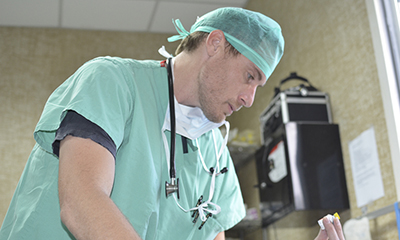
Dr. Isaac Hotz performs surgery.
Meanwhile, the baby’s mother started to have a horrendous post-partum hemorrhage. She failed to respond to any of the medications or interventions we tried, and we had to mobilize about 20 other people to keep her alive. In a miraculous, God-ordained circumstance, a visiting surgical team was in the hospital unpacking supplies at that late hour. A lot of them happened to have the same blood type as our patient. She received eight transfusions of uncrossed whole blood to keep her alive until our general surgeons could do a hysterectomy. She ended up surviving and doing very well.
A Fight to Survive
But her baby boy got worse and needed a lot of oxygen and support with intravenous (IV) fluids and CPAP. Usually meconium aspiration is at its worst during days two and three and then starts to get better. I told this information to his parents, letting them know that I expected to be sending their happy family back home in just a couple of days.
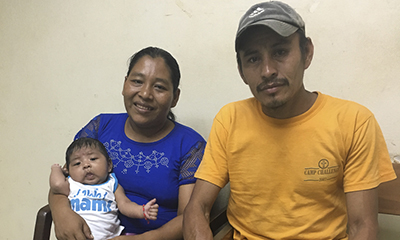
Amilcar and his parents received great care from Drs. Hotz and the staff at Hospital Loma de Luz.
A couple of days passed and the baby, who they named Amilcar, was still on oxygen. I kept telling his parents to be patient, but they started to get anxious to go. The father worked for a daily wage of 150 lempiras ($7) and needed to get back to work. The other children were caring for themselves at home. The mother didn’t want to be left alone in the hospital, so she wouldn’t let her husband leave without her.
When Amilcar was a week old, the parents told me they were leaving and taking their son with them. I told them that they would kill him if they did that. He had developed a couple of dreaded complications from meconium aspiration syndrome. The main treatment is oxygen, and time. The good news is that it is possible to completely recover from it.
Once the parents realized that Amilcar’s hospital stay would likely be weeks longer, and that we in no way expected them to be present for his entire stay, they started to relax. They had to be reassured that their leaving him would not be seen as abandonment, and that he would go home with them once he was off oxygen.
Amilcar’s big sister and brother, as well as some other family members, came down from the mountain in shifts in order to give his mom a break and a chance to go home. The father despaired that his baby boy would ever be able to go home. At one point, the father and mother said they would never come to our hospital again.
Finally, when the baby was a month old—after failing to wean him from oxygen several times—I knelt by his bed in despair. I prayed that God would heal him and feared that I would have to send him home, even with a low oxygen saturation.
A Breakthrough for the Baby
The only thing we hadn’t tried was Viagra. The IV form of the drug is often used in the U.S. to help babies wean off of oxygen because it causes the pulmonary arteries to relax and dilate. Since the only form we had available was oral, we were reticent to try it. However, after over a month of waiting for Amilcar to improve, we finally had to take the risk.
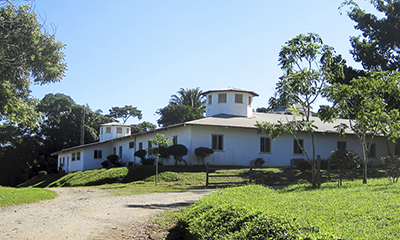
Since 2008, World Medical Mission has been sending post-residents to Hospital Loma de Luz located near La Ceiba, Honduras.
To our surprise, within a week of starting the medication, we were able to wean him off of oxygen! Amilcar ended up going home soon after that and took the medicine for another month.
His parents have come back to the hospital several times for his checkups. I am so glad that with perseverance we earned their trust in our medical care. We are grateful for the Lord’s provision and care for this now healthy mother and child.
Note: This year marks the 15th anniversary of World Medical Mission’s Post-Residency Program. More than 170 doctors and dentists have served in some 40 international Christian hospitals, and many of them continue to serve faithfully on the mission field. Samaritan’s Purse welcomed 12 more young men and women to the program during orientation the first week of August.
